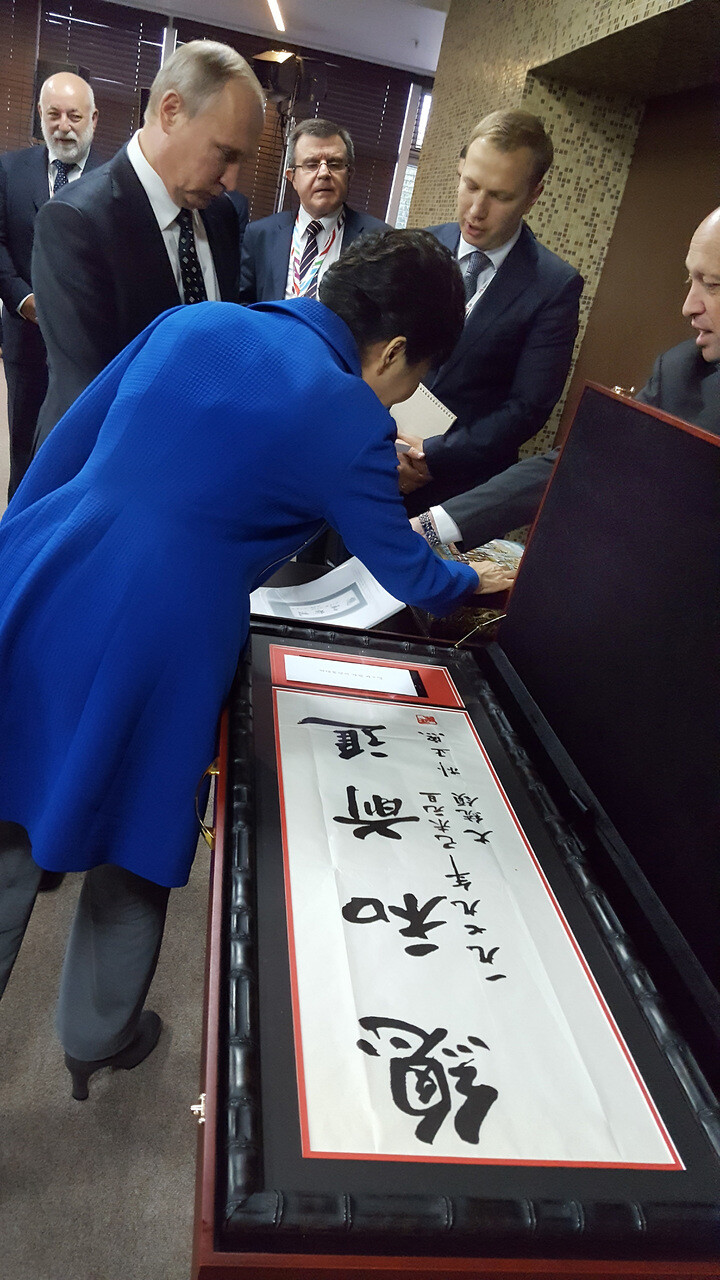hankyoreh
Links to other country sites 다른 나라 사이트 링크
[Editorial] No headway on Korean issues at Russia, China summits

Despite South Korea-Russia and US-China summits in Vladivostok and Hangzhou this week, no progress was made on either the Terminal High Altitude Area Defense (THAAD) antimissile system or North Korean nuclear issues. It is worrisome to see how entrenched the conflicts are becoming among the countries involved in Korean Peninsula and Northeast Asia issues.
In terms of efforts to reduce greenhouse gases, it was encouraging to see the US and China submitting ratification documents for the Paris agreement – the new climate regime under the UN Framework Convention on Climate Change – to UN Secretary-General Ban Ki-moon ahead of their summit. With the ratifications of two countries that account for around 40% of global greenhouse gas emissions, the agreement looks more likely to enter effect within the year. South Korea should also be an active participant. Also positive were the discussions on expanding economic cooperation between South Korean and Russian businesses at the South Korea-Russia summit.
But as far as other key issues involving the peninsula were concerned, differences of opinion remained. Chinese President Xi Jinping sent a clear message of opposition to the THAAD deployment in South Korea, while US President Barack Obama avoided the issue entirely, referring instead to a more general “protection of the security of the US’s allies.”
In terms of resolving the North Korea nuclear issue, China called for everyone to avoid raising tensions and make “active efforts to get the situation back on the right track,” while the US’s focus was on the North Korea threat and sanctions against it. The two sides also continued talking past each other on South China Sea issues and concerns about China’s human rights. With little time left in his term, it looks as though Obama has opted for maintaining and managing the status quo instead of trying for any new negotiations or compromises.
Signs of differences on how to address the North Korean nuclear issue were also clearly evident at the South Korea-Russia summit: South Korean President Park Geun-hye continued to advocate for stronger sanctions and pressure on Pyongyang, while Russian President Vladimir Putin stressed the importance of engaging with Pyongyang in negotiations.
Fortunately, the THAAD issue was not addressed directly at the summit, but nothing has changed in terms of Moscow’s opposition to it. Since the summit was organized around the issue of developing Russia’s far eastern region, its focus was more on expanding bilateral economic cooperation – as was also the case with Putin’s calls for resuming the trilateral Rajin-Hasan project with North Korea.
Ahead of the South Korea-Russia summit came another between Russia and Japan, which discussed claims on four of the Kuril Islands (known in Japan as the Northern Territories) and the signing of a peace treaty. Amid a general climate of conflict in Northeast Asia, relations between Moscow and Japan, at least, seem to have entered a new stage. Their pragmatic attitude should be an example to everyone.
Please direct questions or comments to [english@hani.co.kr]

Editorial・opinion
![[Column] Park Geun-hye déjà vu in Yoon Suk-yeol [Column] Park Geun-hye déjà vu in Yoon Suk-yeol](https://flexible.img.hani.co.kr/flexible/normal/500/300/imgdb/original/2024/0424/651713945113788.jpg) [Column] Park Geun-hye déjà vu in Yoon Suk-yeol
[Column] Park Geun-hye déjà vu in Yoon Suk-yeol![[Editorial] New weight of N. Korea’s nuclear threats makes dialogue all the more urgent [Editorial] New weight of N. Korea’s nuclear threats makes dialogue all the more urgent](https://flexible.img.hani.co.kr/flexible/normal/500/300/imgdb/original/2024/0424/7317139454662664.jpg) [Editorial] New weight of N. Korea’s nuclear threats makes dialogue all the more urgent
[Editorial] New weight of N. Korea’s nuclear threats makes dialogue all the more urgent- [Guest essay] The real reason Korea’s new right wants to dub Rhee a founding father
- [Column] ‘Choson’: Is it time we start referring to N. Korea in its own terms?
- [Editorial] Japan’s rewriting of history with Korea has gone too far
- [Column] The president’s questionable capacity for dialogue
- [Column] Are chaebol firms just pizza pies for families to divvy up as they please?
- [Column] Has Korea, too, crossed the Rubicon on China?
- [Correspondent’s column] In Japan’s alliance with US, echoes of its past alliances with UK
- [Editorial] Does Yoon think the Korean public is wrong?
Most viewed articles
- 1[Column] Park Geun-hye déjà vu in Yoon Suk-yeol
- 2N. Korean hackers breached 10 defense contractors in South for months, police say
- 3Will NewJeans end up collateral damage in internal feud at K-pop juggernaut Hybe?
- 4Kim Jong-un expressed ‘satisfaction’ with nuclear counterstrike drill directed at South
- 5[Editorial] New weight of N. Korea’s nuclear threats makes dialogue all the more urgent
- 6[Cine feature] A new shift in the Korean film investment and distribution market
- 7[Column] ‘Choson’: Is it time we start referring to N. Korea in its own terms?
- 8[Column] The clock is ticking for Korea’s first lady
- 9[Editorial] Japan’s rewriting of history with Korea has gone too far
- 10Thursday to mark start of resignations by senior doctors amid standoff with government